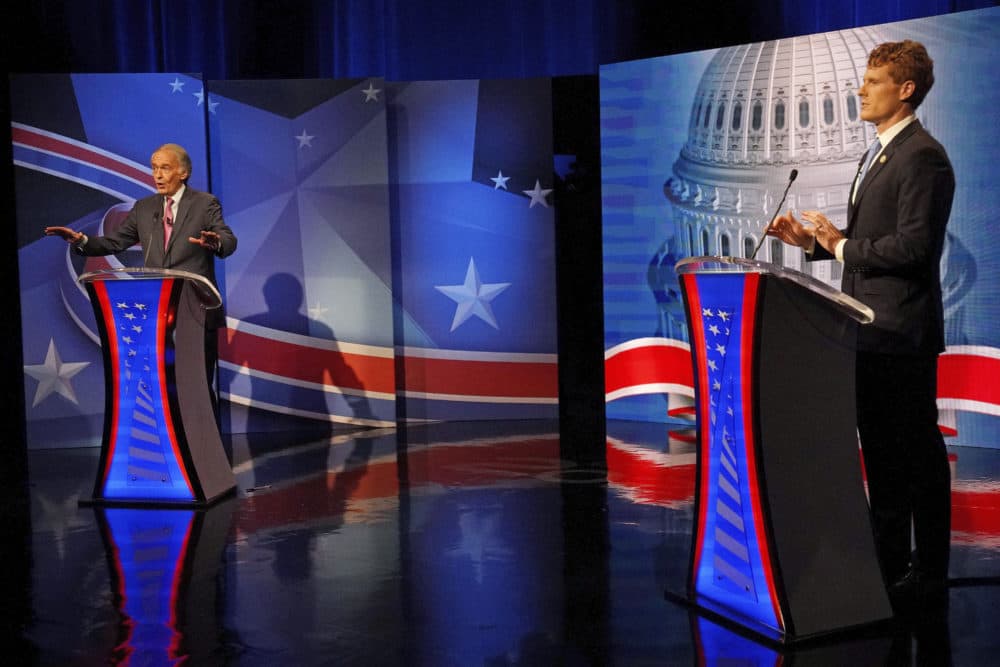Advertisement
Markey And Kennedy Agree On Policies, Trade Blame For Negative Tone In Final Debate

Sen. Ed Markey and Rep. Joe Kennedy on Tuesday offered similar policy ideas during their final debate but blamed each other for the devolving tone and outside spending that has come to characterize their Democratic primary contest.
Separated by 35 years and seemingly little else, the candidates agreed on such progressive proposals as moving to a single-payer health care system, passing the Green New Deal to combat climate change, and reforming police agencies to address racial inequities in law enforcement.
Yet Markey accused Kennedy of allowing a super PAC linked to his famous family to "pollute" the election with negative ads. Kennedy, in turn, said the group only exists because Markey refused to renew a "people's pledge" to reject third-party spending that the senator made in a previous campaign.
Two weeks before primary day, and with some voters already casting ballots by mail, Markey and Kennedy are neck and neck, according to the RealClearPolitics polling average.
The tight race has turned tense in recent weeks, with each candidate assailing the other's record on racial justice.
In Tuesday's debate, Kennedy again criticized Markey for opposing court-ordered busing to desegregate Boston Public Schools in the 1970s. Markey has countered that he changed his position on busing decades ago.
Kennedy also invoked the family of D.J. Henry, a Black college student from Massachusetts who was shot and killed by a white police officer in 2010. Henry's parents are outspoken supporters of Kennedy and have publicly criticized Markey for, in their view, doing too little to achieve justice for their son.
"A mom and dad came to a United States senator to ask for his help in providing justice for a murdered son, and they got nothing in response," Kennedy said.
Markey disputed the notion that he did "nothing," noting he joined other members of the Massachusetts delegation in signing letters to the Justice Department on the Henrys' behalf. But he acknowledged that his effort has disappointed the Henrys and repeated an apology he previously issued to the family.
Advertisement
Markey insisted that, in general, he responds to and fights for the people he represents.
"In terms of my constituent work, I am proud of it," he said. "And I work very hard in order to make sure that I deliver for the people of Massachusetts, and I've done that consistently throughout my career. And whether it be the fishermen, the gig workers, the opioid crisis, that is who I have been throughout my career."
Markey, somewhat surprisingly, did not raise Kennedy's decision, two decades ago, to join the Stanford University chapter of Kappa Alpha, a national fraternity with deeply racist roots. Markey has attacked Kennedy's Kappa Alpha membership in the past, and the fraternity was the subject of a front-page Boston Globe story Tuesday.
In perhaps the most emotional moment of the debate, Kennedy appeared to agonize over a question about whether Boston Marathon bomber Dzhokhar Tsarnaev should be eligible for parole. A federal appeals court recently overturned Tsarnaev's death sentence, and the Boston Bar Association is urging the Justice Department to pursue life in prison, instead.
Markey and Kennedy generally oppose life sentences without opportunities for parole, but Markey said, "I would make an exception for a terrorist."
Kennedy, however, said, "I stand by my position." He emphasized that "the possibility of parole doesn't mean you're granted it," adding "Before any decision would be made on that specific case, those victims' families need to be heard loud and clear."
